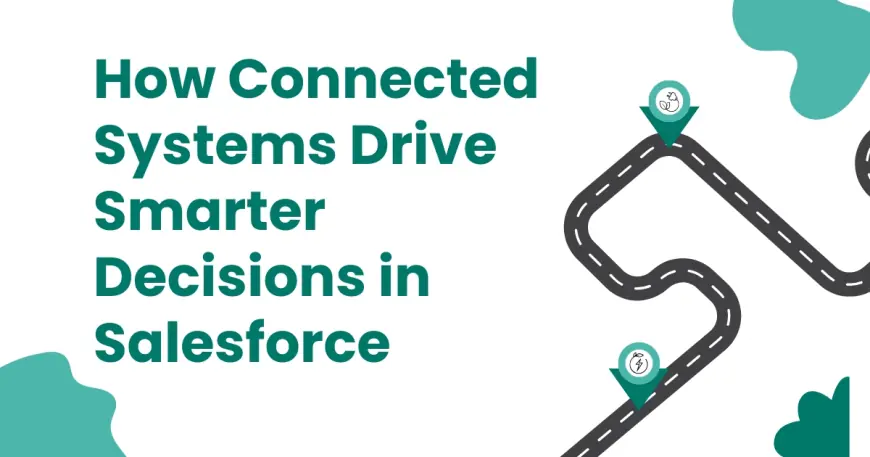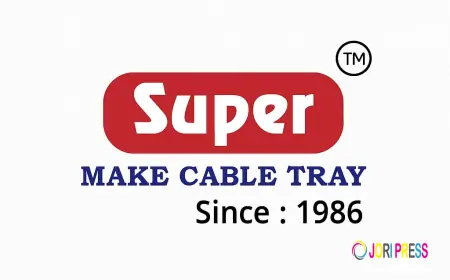How Connected Systems Drive Smarter Decisions in Salesforce
Businesses thrive in today's data driven world on speed, accuracy and collaboration. Connecting different systems and apps within one ecosystem is one of the best ways to achieve that. Salesforce integration services are crucial in this regard. Salesforce integration services can help organizations connect Salesforce to various business tools, such as ERP systems or marketing platforms.

Businesses thrive in today's data driven world on speed, accuracy and collaboration. Connecting different systems and apps within one ecosystem is one of the best ways to achieve that. Salesforce integration services are crucial in this regard. Salesforce integration services can help organizations connect Salesforce to various business tools, such as ERP systems or marketing platforms.
This blog will examine how connected systems can enhance Salesforce capabilities and streamline operations. It will also empower businesses to make informed decisions that have a direct impact on growth and efficiency.
The Importance of Connected Systems in Salesforce
As the leading CRM in the world, Salesforce is designed to streamline business processes and centralize data. Despite this, many organizations use multiple tools to manage accounting, marketing automation and HR. These systems can become silos and trap valuable data, making it hard for teams to work together.
Companies can achieve the following by creating seamless connections between Salesforce.com and other business software:
-
Data Consistency: A single source of truth across all departments.
-
Enhanced Productivity: Employees spend less time switching between apps and more time focusing on strategic tasks.
-
Real-Time Insights: Decision-makers can act on the latest information instead of outdated or incomplete data.
How Connected Systems Drive Smarter Decisions
1. Unified Customer View
Connecting systems to Salesforce can give you a 360-degree customer view. Salesforce allows sales teams to see the results of marketing campaigns, customer service interactions and financial histories. This holistic view allows for personalized communication, improved upsell opportunities, as well as increased customer satisfaction.
2. Faster and More Accurate Reporting
Disconnected systems can lead to fragmented, time-consuming reports. Salesforce can be integrated with ERP or analytics platforms to generate accurate reports and real-time dashboards. This allows leaders to track KPIs immediately and adjust strategies using current data, rather than guesswork.
3. Streamlined Workflows Across Departments
Automating repetitive tasks is possible when systems are integrated. When a deal closes in Salesforce, the integration with an ERP can update inventory, trigger billing, and notify delivery teams. This automation from end to end reduces errors, and aligns departments for smoother operations.
4. Smarter Forecasting and Planning
Access to current and complete data is essential for accurate forecasting. Businesses can better predict revenue, manage the demand and allocate resources by integrating Salesforce to accounting tools and supply-chain platforms. This level of insight allows businesses to be proactive instead of reacting after problems occur.
5. Improved Customer Support
Support teams rely heavily on helpdesks and ticketing systems. Support agents can instantly access the purchase history of a customer, their past complaints and account information when these systems are integrated with Salesforce. It allows agents to provide better customer service and resolve issues more quickly.
Real-World Applications of Connected Systems
-
Marketing & Sales Alignment: Integrating marketing automation platforms into Salesforce will ensure that sales teams are receiving qualified leads, which have behavioral insights. This allows for smarter strategies in sales.
-
Finance Integration: By linking accounting systems to Salesforce, sales teams can see invoices, revenue, and payments. This allows them to make more informed financial decisions.
-
E-commerce Integration: Retailers who connect their online stores to Salesforce get a unified overview of orders, inventories, and interactions with customers, allowing them to create personalized shopping experiences.
-
HR & Onboarding: Integration with HR platforms enables seamless onboarding and tracking employee performance.
Benefits Businesses Experience
Organizations that adopt connected systems with Salesforce often experience:
-
Higher Efficiency: Automated workflows save time and reduce manual effort.
-
Data Accuracy: Real-time synchronization prevents duplication and inconsistencies.
-
Better Collaboration: Teams across departments work on shared data, improving coordination.
-
Customer-Centric Growth: Insights from multiple touchpoints allow businesses to design strategies centered on customer needs.
Conclusion
Data-driven decision making is essential to a competitive business environment. Businesses can unlock the full power of Salesforce by connecting different systems and tools. They gain a single source for truth and useful insights. Whether streamlining workflows or improving customer experience, integrated systems enable organizations to make better decisions that will fuel their long-term success.
Salesforce integration services India offer the customization and support required to ensure seamless connectivity between platforms. Integration not only improves Salesforce functionality, but it also helps businesses to stay ahead of the curve in their digital transformation journey.
What's Your Reaction?
 Like
0
Like
0
 Dislike
0
Dislike
0
 Love
0
Love
0
 Funny
0
Funny
0
 Angry
0
Angry
0
 Sad
0
Sad
0
 Wow
0
Wow
0

















































